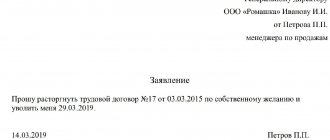Home / Labor Law / Payment and Benefits / Bonuses
Back
Published: 05/15/2016
Reading time: 7 min
0
5402
Along with disciplinary sanctions that can be applied to employees in accordance with the Labor Code of the Russian Federation, some companies practice the use of material forms of punishment.
One of these forms is depreciation, which, subject to certain rules, can be used quite legally. It is worth considering the basic rules for using bonus reduction in an enterprise, as well as the conditions for the legality of this procedure.
- Deprivation of bonuses: essence and legislative regulation
- Legality of the procedure: conditions and possible violations
- Advantages and disadvantages
Bonuses and deductions for employees
Many organizations reward their staff for good achievements at work (exceeding standards, high quality work) with bonus money. This encourages subordinates to constantly strive for the best results and improves the efficiency of the business as a whole. The accrual conditions, types and amounts of such bonuses are prescribed in internal regulatory documents.
Of course, deprivation of bonuses to an employee is possible if a disciplinary offense is committed. It implies deprivation of the full or partial amount of the bonus that comes with the salary.
Deductions can be made, for example, in the following cases:
- failure to maintain order in the workplace;
- violation of safety rules;
- presence of complaints from clients;
- making errors in reporting documentation;
- failure to ensure the safety of inventory items, etc.
Also see: Reprimanding Foul Language at Work: Keeping Civility Safe.
I was deprived of my bonus without an order
Only having this document in hand, with the conditions and reasons for depreciation clearly stated in it, as well as its percentage, will these actions of the administration be considered legal.
- The decision to deprive a bonus must be documented, and the employee to whom it applies must be notified in writing against signature.
- The time frame for deprivation of bonuses is also clearly stated in the company’s internal regulations.
This is also important to know:
How and where to appeal a disciplinary sanction
The main point that the administration and the head of the enterprise must take into account when choosing to deprive an employee of a bonus is only if there is a documented fact of violation of labor discipline, non-compliance with the terms of the contract, and is legally justified. Any case of deprivation of a bonus without the presence of this document is illegal.
Russian labor legislation allows an employee who considers non-payment of a cash bonus to be an unreasonable action to appeal the decision to deprive him or her of bonuses to higher judicial authorities and the Federal Labor Inspectorate within 90 days after the relevant order is issued that infringes on his rights.
According to the law, it is possible to deprive a person who has violated discipline of material incentives (bonuses) only within one calendar month from the moment the offense was committed and the fact of its official registration (Article 3 of the Russian Labor Code).
Availability of regulations on bonuses at the enterprise. Only having this document in hand, with the conditions and reasons for depreciation clearly stated in it, as well as its percentage, will these actions of the administration be considered legal.
- The decision to deprive a bonus must be documented, and the employee to whom it applies must be notified in writing against signature.
- The time frame for deprivation of bonuses is also clearly stated in the company’s internal regulations.
Current version of Art. 191 of the Labor Code of the Russian Federation with comments and additions for 2018
The employer encourages employees who conscientiously perform their job duties (declares gratitude, gives a bonus, awards a valuable gift, a certificate of honor, nominates them for the title of the best in their profession). Other types of employee incentives for work are determined by a collective agreement or internal labor regulations, as well as charters and regulations about discipline. For special labor services to society and the state, employees may be nominated for state awards.
Deprivation of bonuses to employees: Labor Code
The legislation does not provide for such a penalty as deprivation of bonuses. There are only three types of disciplinary sanctions. They are listed in Article 192 of the Labor Code of the Russian Federation: warning, reprimand and dismissal. And there is nothing about the abolition of incentives.
The Labor Code allows the employer to provide for these types of punishments for certain categories of employees in its internal documents, but directly declaring deprivation of bonuses is not encouraged.
It is better to just list the conditions on the basis of which a bonus can be assigned. And proceed from the opposite: violated/did not violate any condition.
Reasons for deprivation of bonuses
Labor legislation does not establish the grounds and procedure for deprivation of bonuses, as well as the amount of reduction in incentive payments. They are determined by the employer independently within the framework of his organization and secured by relevant regulations. Typically, the reason for deprivation of bonuses is directly related to the performance of labor functions, for example:
- delay in performance of work or provision of services;
- failure to fulfill the work plan for a certain period for which the bonus is calculated;
- refusal to comply with management orders within the scope of official duties;
- the presence of a disciplinary action within the time period for which the bonus is awarded;
- failure to comply with safety regulations;
- deviation from the production process, as well as the production of defective products;
- establishing shortages, identifying cases of theft and criminal prosecution in this regard.
Let us note that deprivation of a bonus is the result of a violation of labor order or discipline; it must only be thorough. The grounds for deprivation of bonuses must be listed in the organization’s document regulating the bonus system. Otherwise, the court will consider the employer’s actions illegal.
Important nuance
When signing an employment contract with an employee, the wording on the components of the salary is of great importance (see table).
| Formulations | Interpretation |
| Salary includes salary, allowances and bonuses | The payments in question are part of remuneration, not incentives. Therefore, the employer does not have the right to take them away from the employee, otherwise he will be held accountable. The legal grounds for withholding wages are listed in Art. 137 and 138 of the Labor Code of the Russian Federation. |
| The contract states that the salary consists of a constant (salary + allowances) and variable (bonuses) parts | Payments have the status of incentive bonuses. If the conditions of the internal regulations are not met, the employee is simply not awarded a bonus. To do this, if necessary, they provide a link to an internal document, which the employee must familiarize himself with under signature. |
EXAMPLE Ponomarev, holding the position of driver, committed a disciplinary offense - he repeatedly violated the schedule for the start and end of work on the route. The director of the organization reprimanded the employee and refused to award the bonus.
Essence and functions
Of course, the intensity of work by position can vary significantly. In this regard, many enterprises provide in their local regulations the opportunity to reward certain employees financially for special successes in their work.
Also, bonus payments are usually equated to various final periods (for example, for a quarter, half a year or year).
At the same time, given that it is impossible by law to spend the wage fund uncontrollably, the conditions for paying bonuses, as well as specific amounts, are fixed in the company’s local regulations. Accordingly, along with the rules of financial incentives, conditions for deprivation of long-awaited payments are also provided, again based on the conditions enshrined in the same Regulations on the payment of bonuses.
So, if an employee violated the same internal rules or did not submit a report on time, he may be deprived of a bonus for a certain period of time as leverage to improve his performance.
After all, it is inappropriate to fire a good employee for just one mistake, but punishing him as an edification to him and everyone else is quite effective.
How to organize a bonus reduction system
Developing a bonus system for employees is not an easy task. Employers often make mistakes that ultimately have the opposite effect. Here are the most common of them (see table):
| № | Error | What's wrong |
| 1 | Informing an employee about the deprivation of a bonus only upon receipt of a pay slip | Over the past period, a person may forget what exactly he violated. As a result, motivation to work is lost. |
| 2 | Inaccurate wording about incentive conditions in local acts | The employee must know exactly for what amount of work and achievements he is entitled to additional payments, as well as their amount. An example of a successful formulation: “When completing 10 or more projects, the employee receives a bonus of 50% of the salary.” |
Advantages of using a bonus reduction system :
- increase in the efficiency of the economic activity of the company, individual entrepreneur;
- increasing responsibility on the part of employers and employees;
- improvement of labor discipline;
- the factor of collective responsibility has a positive effect (due to the fault of one person another may suffer);
- the opportunity for a manager to control deviations, analyze the situation and make the right decisions.
The disadvantages include:
- worsening psychological climate (possible conflicts with colleagues or decreased loyalty on the part of management);
- in the future, deprivation of bonuses may become an obstacle to the full development of the employee’s potential;
- the system is focused on achieving the overall goals of the enterprise, so the interests of individual employees may not be taken into account.
Every employer strives to grow their business and increase profits. Is it worth depriving workers of bonuses for this? Depends on the result he is interested in achieving (see table).
| Result | A comment |
| Short term, fast | Reducing bonuses will be an effective tool, but to the detriment of promising projects. In addition, you need to have a good understanding of the nuances of legislation. |
| Long term | We recommend using a performance-based remuneration system |
as an example of a system for depriving employees .
EXAMPLE The Antares factory has defined goals for the product production department:
- Volume: 2500 pcs/month.
- Each product meets quality standards.
- Reducing costs without losing quality.
- Timely delivery of products.
Based on these goals, indicators were developed, the deviation of which will not result in additional payments. These included:
- the quantity of products that must be present in the warehouse at a certain time;
- percentage of plan completion;
- the quality of products meets established standards;
- compliance with raw material consumption standards.
An additional condition has been established: for the return of products, the workshop manager is subject to a deduction as a percentage of the calculated amount of remuneration.
Employee Bonus Deprivation Law 2021?
Labor legislation (Article 129 of the Labor Code of the Russian Federation) gives the concept of wages as remuneration for work performed depending on:
- conditions;
- quality of execution;
- employee qualifications;
- as well as other incentive and compensation payments.
Bonuses are precisely incentive payments. However, when establishing any additional payments in favor of employees, the employer must be guided by its local acts, which follows from the text of Art. 135 Labor Code of the Russian Federation .
The system of remuneration and bonuses in the organization is established:
- collective agreement;
- local regulatory documents;
- stated in the employment agreement with employees.
All of them must not contradict current labor legislation.
The bonus can be an incentive for conscientious work or a component of wages. In any case, it is established by order of the employer, indicating the employees subject to bonuses, the amount of the bonus and the calculation procedure.
Local documents of the organization also establish the possibility of depriving employees of bonus payments, and prescribe cases and grounds when such a procedure can be applied.
What documents should I submit?
The organization must correctly fulfill all formalities when calculating or reducing bonuses. This fact is recorded in the order to deprive the employee of bonuses . The legislation does not provide an established template, so it is drawn up in free form. A prerequisite is to indicate the reason for deprivation of additional payments.
Please note: the order on depreciation should not resemble an act recording a disciplinary offense by an employee. Its content should be unambiguous and not ambiguous.
When writing the text of an order to deprive an employee of bonuses, we do not recommend using the phrases “deprivation”, “violation”. It is better to replace them with “decrease”, “non-achievement of indicators”.
A completed sample depreciation order may look like this:
The procedure for depriving an employee of additional payments requires compliance with two conditions:
- the enterprise has a provision on bonuses, which specifies all the nuances and terms (from 01/01/2017, a small business can work without them, subject to the transfer of such provisions into employment contracts);
- The manager’s decision to deprive him is formalized by order (signatures of the interested parties are required).
In what cases will deprivation of bonuses be considered illegal?
Deprivation of bonuses to employees is considered illegal in the following situations:
- the basis on which the bonus was deprived is not in the corresponding list in the local regulatory act of the organization;
- an order has not been issued in accordance with which the bonus is deprived;
- the employee is not familiar with the order (order) imposing deprivation of bonus payments on him;
- the procedure for deprivation of bonuses due to the imposition of a disciplinary sanction was not followed (read above).
In such cases, the employee has the right to challenge the deprivation of the bonus in accordance with Art. 392 TK. It can be done:
- in court no later than 90 days from the date of establishment of a violation of the law by the employer;
- pre-trial, the employee has the right to resolve the situation through the Labor Inspectorate.
Responsibility for illegal deprivation of bonuses to employees
When a company illegally deprives an employee of bonus payments, which is documented, it is brought to administrative liability under Art. 5.27 Code of Administrative Offences. Possible penalties are presented in the table.
| Status | Amount of fine for the first violation, rub. | Types of penalties for violation again |
| Executive | 10 000 – 20 000 | • fine: 20 – 30 thousand rubles; • deprivation of the right to practice for up to three years. |
| Businessman | 1000 – 5000 | Fine 10 – 30 thousand rubles. |
| Firm | 30 000 – 50 000 | Fine 50 – 100 thousand rubles. |
The employer is obliged to timely issue not only wages, but also bonuses.
Otherwise, he pays all amounts with interest accrued in the amount of 1/150 of the current refinancing rate of the Central Bank of the Russian Federation (10%). Also see “What are the penalties for non-payment of wages”.
Typical case law
| Situation | Solution |
| The LLC transferred the bonus to all employees, with the exception of the sales department manager S. The employee filed a complaint with the bailiffs. | The plaintiff’s demand was not satisfied, since the deprivation was due to failure to fulfill the production plan specified in the internal regulations of the LLC. The employer made the reduction in bonuses on a legal basis. |
| K. left the company at the end of December. Its internal documents state that bonuses are awarded at the end of the year for achieving high production indicators. The employee did not receive the required payments, so he went to court. | The employee’s claim was fully satisfied, since the bonus regulations include a rule on the accrual of incentive payments for achieving good results. And in case of leaving the company at the end of the year, there is no provision for issuing an order on depreciation . |
| The management of the company paid K an annual bonus in the amount of 7% of his salary. The employee did not agree with the decision, so she filed a lawsuit. | K.’s demand was not satisfied for the following reasons: a) according to the terms of the employment contract, the official salary was established, and bonuses are not part of the salary; b) internal rules provide for a bonus - 25% of the salary, subject to compliance with a number of points. The employer reduced this rate to 7% due to improper performance of labor duties (evidence presented in court). |
Also see “How an employee is deprived of a bonus under the Labor Code of the Russian Federation.”
Read also
13.11.2017
What can the payment of a bonus depend on and what can it not?
As mentioned above, according to the Legislation of the Russian Federation, all actions related to payments and deprivations of bonuses are established and approved by the management of the enterprise.
Thus, company management has the right to independently develop a bonus line and confirm it with relevant documents (regulations).
Factors that may affect the payment of the premium:
- fulfillment of planned indicators;
- compliance with discipline and full performance of official duties;
- positive feedback from clients (customers, suppliers or other persons with whom the organization cooperates and the employee interacts);
- in exceptional cases, the bonus may be affected by good relations with management (execution of additional assignments);
- exceeding the personal plan and helping other employees fulfill their plan;
- active participation in the life of the enterprise (various events, competitions, etc.);
- developing innovations for implementation in the work process (for example, how to simplify the work process);
- new ideas that serve the benefit of the company as a whole (increasing profits, etc.).
The premium cannot be affected by:
- The appearance of an employee cannot in any way affect the payment of a bonus or its deprivation;
- personal qualities of the employee (character, interest in work);
- conflict, disputes and similar situations;
- person's gender and race;
- bad human habits (for example, smoking in a specially designated area).










